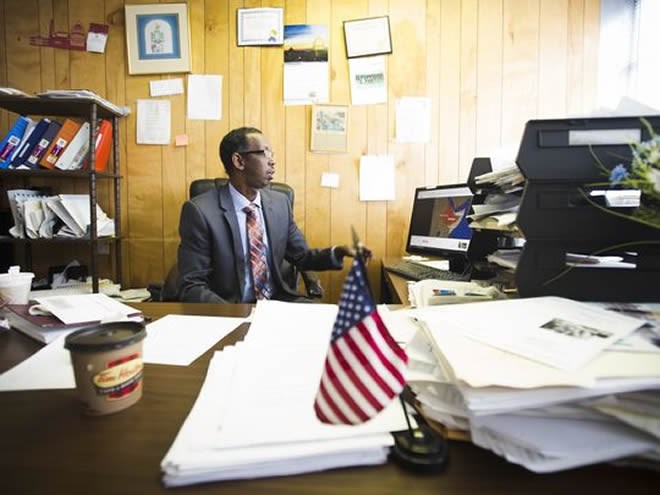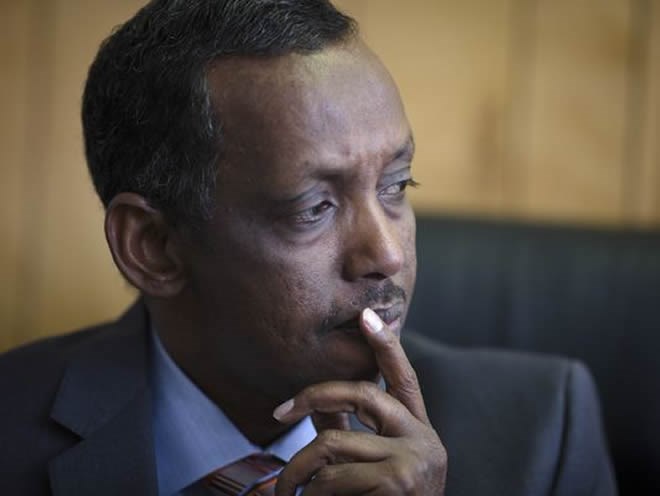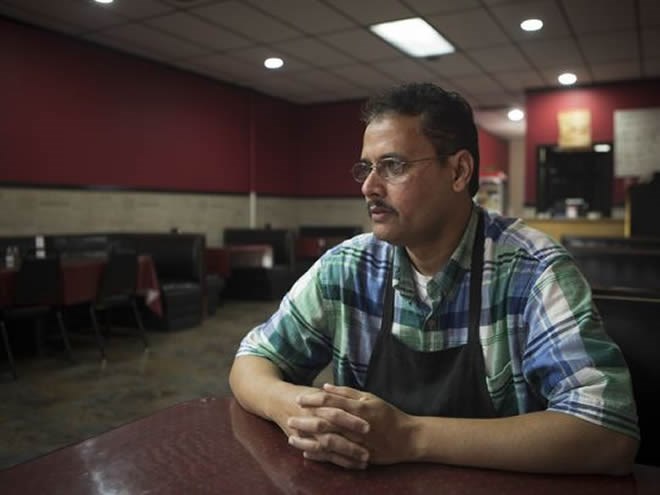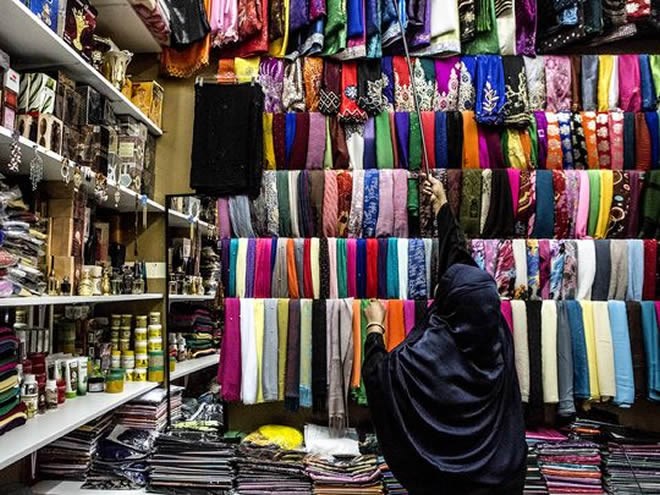
Friday, December 02, 2016
By Chris Graves

Hassan Omar, president of the Somali Community Association of Ohio, sits in his office Wednesday, Nov. 30, 2016, two days after Abdul Razak Ali Artan, a Somali immigrant, was shot and killed by an OSU police officer after Artan attacked pedestrians with a car and a butcher's knife. (Photo: The Enquirer/ Carrie Cochran, The Enquirer/ Carrie Cochran)
COLUMBUS — Hassan Omar hurriedly removed the framed painting proclaiming in bold red letters, "I ♥ Somali" from the back wall of his small office.
He didn't want it to serve as a backdrop in pictures the newspaper photographer was taking.
The image, like much in these days after the Ohio State University attack, might be misunderstood or taken out of context, said the Somali Community Association of Ohio president as he tucked the painting under his desk and out of sight.
But it was hardly out of mind.
"I am American,'' said Omar, who has worked with the U.S. military and was granted political asylum in the U.S. from his homeland of Somalia. "What some believe about us is not who we are.
"We love this country. We don't separate ourselves,'' Omar said. "We are not Somali-Americans.
"We are Americans."
"We are Ohioans."
"We are Columbus."
Omar, like many of his Somali friends, spent this past week painstakingly explaining their country, their Muslim faith and the economic and social impact they've had here in central Ohio to anyone who would listen. Simultaneously, he and others vehemently denounced the erratic actions of the 18-year-old who carried out car-and-knife attacks at OSU Monday morning that left him dead and 13 others injured.
Federal authorities said the attacker, Abdul Razak Ali Artan, might have been inspired by Anwar al-Awlaki, an al-Qaeda recruiter and propagandist, or by the Islamic State terrorist group. The FBI continues to probe Artan's whereabouts before the attacks, his associates and his online life. Shortly before the attacks, Artan posted a rant on Facebook calling al-Awlaki a "hero." He also wrote that the U.S. could stop "lone wolf attacks" by making peace with ISIS.

Hassan Omar, president of the Somali Community Association of Ohio, sits in his office Wednesday, Nov. 30, 2016, two days after Abdul Razak Ali Artan, a Somali immigrant, was shot and killed by an OSU police officer after Artan attacked pedestrians with a car and a butcher's knife. (Photo: The Enquirer/ Carrie Cochran, The Enquirer/ Carrie Cochran)
But Mohamed Diini, an imam in Columbus, said he knows one thing: Artan was not acting as a Muslim or in the name of Islam.
"The Muslim faith, Islamic theology is quite clear about this: He who tries to take the life, or takes the life, of one human being, it would be, in the sight of God as if he had taken the life of all of humanity,'' Diini said at a gathering of Somali men Tuesday evening who gathered to talk to the media. "What happened at OSU was un-Somali, un-American, un-Islamic, inhumane."
And, he added, criminal.
"I know our neighbors know better than to judge us by the actions of one lone, deviant individual,'' he said.
Facts and fear
However, a tweet by President-elect Donald Trump crystallized their worst fear — even if few said it aloud to strangers here last week.
“ISIS,'' Trump tweeted early Wednesday, "is taking credit for the terrible stabbing attack at Ohio State University by a Somali refugee who should not have been in our country.”
As of Friday, however, there was no known proof that Artan was part of any terrorist group. ISIS often takes credit for lone wolf attacks.
Officials have confirmed Artan was a permanent legal resident of the United States, having fled war-ravaged Somalia in 2007 with his family to a refugee camp in Pakistan. He and at least six family members entered the U.S. in 2014, first moving to Dallas and then to Columbus. Many Somalis move to Columbus to be close to family and friends because the city has a much lower cost of living than Minneapolis and Seattle, where many Somalis have resettled.
Estimates vary widely on the number of Somalis who call Columbus home — from 15,000 to more than 40,000. Some, like Omar, put that number closer to 60,000 and say it could be higher. Accurate population figures are nearly impossible to gauge because of secondary migration. It is widely believed Columbus trails only Minneapolis in its number of Somalis.
A 2015 report, citing the Bureau of Population, Refugees and Migration, said 5,936 Somali refugees have resettled in Franklin County. But that does not take into account children born here or other family members who migrated later.
"Somalis prefer to cluster where they have mutual support,'' said Kenneth Menkhaus, a political science professor at Davidson College in North Carolina and an expert on Somalia. "They are very intentional on where they settle."
Many may be financially poor, he said, ''but they are rich in social capital in ways Americans are not. They call on each other."
Which is why the actions Monday of a dedicated student, who bought chips at a corner market and gyros at a Pakistani-owned restaurant next door and often helped his white neighbor, don't seem to square for those who knew Artan.

Niaz Sddiqui, manager of Khyber Restaurant, says that Abdul Razak Ali Artan came to his restaurant almost every day. Artan, a Somali immigrant, was shot and killed by an OSU police officer after Artan attacked pedestrians with a car and a butcher's knife on campus. (Photo: The Enquirer/ Carrie Cochran, The Enquirer/ Carrie Cochran)
"He was always smiling. He never talked about being Muslim,'' said Niaz Sddiqui, the owner of Khyber Restaurant. "He spoke my language — Urdu — and I asked him once: 'What's a Somali guy doing speaking my language?' He said he studied in Pakistan."
The young man, who always wore jeans and had a backpack on his shoulder, also worked at Home Depot, Sddiqui said. Others said he helped his mom out with his younger siblings and might have dropped them off at school before the attack Monday morning.
Those actions all align with Somali culture and Islamic teachings.
Many, if not all, Somalis remit "as much money" as they can back to their families who remain in the fractured country of Somalia, which is in the Horn of Africa. About $1 billion to $1.5 billion is remitted back to Somali annually, Menkhaus said.
"It floats their economy,'' he said.
Hundreds of business owners
Nuro Wardhere, who manages Nuro Fashions in the Global Mall on Morse Road — a neighborhood akin to Little Somali — sends as much money back as she can to her mother, sister and other family members. But, she is quick to add that America, and more specifically Columbus, is home.
"We are American. We live our lives here. We hope to do well together,'' she said, while proudly showing the brightly colored and bejeweled dresses and scarves that line the wall of her booth.
This is the Somali community Omar points to. Families who help raise families, business owners who pool their own capital to get the next Somali businessman off the ground, car and truck dealers who provide interest-free loans to each other.
This is the Columbus Somali community he knows. A community that built itself up. He beams at their accomplishments in less than three decades here.
That 2015 report, called Impact of Refugees in Central Ohio, did not break out Somali-owned businesses specifically, but it estimated there are at least 873 refugee-owned businesses in the Greater Columbus area employing about 3,960 workers. In dollar figures, the businesses generate a total economic impact of $605.7 million a year in the area, according to the report.
For context, Somalis make up more than half of the total refugee population in the area.
"Refugees in Franklin County are more than twice as likely to start a business as the county population in general,'' said the report, which was a collaboration between US Together, Community Refugee & Immigration Services, World Relief Columbus and the City of Columbus.
The report did not analyze the fiscal impact the community has on infrastructure or public services. While the state keeps data on total refugees who receive state aid, it is not broken out by specific group, said Jon Keeling, spokesman for the Ohio Department of Job and Family Services.
These are the stories, Omar said, that don't often get attention. While he won't comment on Trump's tweet — "He's our president now" — Omar can't seem to square how Trump, a business owner, can't see the impact Somalis have on Ohio's economy.
"If we went away,'' he shakes his head while touring the north side of Columbus pointing out Somali-owed businesses for miles, "Columbus would feel it."

Nuro Wardhere, a Somali refugee who came to this country 16 years ago, runs a small fashion shop inside Global Mall on Morse Road in Columbus, Ohio.Wardhere, who is a US citizen, believes Abdul Razak Ali Artan, an OSU student who attacked students on campus Monday before being fatally shot, does not define what it means to be Muslim. (Photo: Jessica Phelps/Newark Advocate)
Judged in the court of God
Omar won't speculate on what may have motivated Artan or why, in such a close-knit and supportive culture, a young man who seemed to have so much would turn into a knife-wielding madman.
Wardhere, a mother of a teenage boy, said he must have suffered from a mental illness, because his actions were not based in Islam.
Menkhaus, too, said that the attack did not seem to fit neatly into any clear pattern. But he added "we have so few of these lone wolf attacks that there isn't a profile. They don't fit a profile.
"This is a great mystery for the Somali community there,'' he added. "It's a great mystery for law enforcement, at least right now."
Diini, the Imam, said it is the Islamic burial ritual that Artan's body would be washed before it is wrapped in cloth and that prayers would be said over his body at a local Islamic Center before he is put to rest.
But he will not be forgiven.
"He has done a crime. But, he is not an animal,'' Diini said. "But his accounting, his judgment will be in the court of God.
"Justice will be served there,'' he said.
Chris Graves is metro columnist for Cincinnati.com and The Cincinnati Enquirer. Follow her on Twitter @chrisgraves.